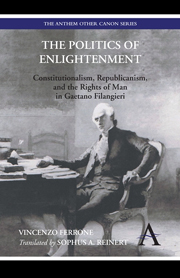 The Politics of Enlightenment
The Politics of Enlightenment from Part One - The New Politics ‘Ex Parte Civium’
Published online by Cambridge University Press: 05 February 2013
Why, beyond the reasons we rapidly sketched out in the previous chapter, did the Scienza della legislazione enjoy such great international success, not only at the end of the eighteenth century, but also in the years of the continent's widespread liberal and democratic struggles, fuelling hopes and simultaneously attracting sharp criticisms? What are the constitutive and characterizing elements, from a political, philosophical, and legal point of view, of the new constitutionalism delineated in Filangieri's work? What dangerous innovation, in other words, lurked in the Neapolitan jurist's framework that was able to generate such durable interest as well as heated diatribes? In answering these questions, one must never forget that those volumes were written in a very particular period in the history of western constitutionalism: between two revolutions, the American and the French, in an era of crisis, of transition, and of rapid changes. Those pages, to which the author, due to his precocious death, would never return, remain precious to this day, the equivalent of a sensitive seismograph, able to register tiny governmental changes, every innovation in the reigning conceptions of law and politics. And, importantly, Filangieri registered the minutest oscillations in the significance of the key term ‘constitution,’ destined, as it was, to dominate the political battles of the nineteenth century. Compared to most European dictionaries, which on the eve of 1789 fully revealed the uncertain and polyvalent character of the term, Filangieri's reflections contributed considerably to clarifying once and for all the modern sense of a constitution as a ‘small code, kept apart, of real fundamental laws.’
To save this book to your Kindle, first ensure [email protected] is added to your Approved Personal Document E-mail List under your Personal Document Settings on the Manage Your Content and Devices page of your Amazon account. Then enter the ‘name’ part of your Kindle email address below. Find out more about saving to your Kindle.
Note you can select to save to either the @free.kindle.com or @kindle.com variations. ‘@free.kindle.com’ emails are free but can only be saved to your device when it is connected to wi-fi. ‘@kindle.com’ emails can be delivered even when you are not connected to wi-fi, but note that service fees apply.
Find out more about the Kindle Personal Document Service.
To save content items to your account, please confirm that you agree to abide by our usage policies. If this is the first time you use this feature, you will be asked to authorise Cambridge Core to connect with your account. Find out more about saving content to Dropbox.
To save content items to your account, please confirm that you agree to abide by our usage policies. If this is the first time you use this feature, you will be asked to authorise Cambridge Core to connect with your account. Find out more about saving content to Google Drive.